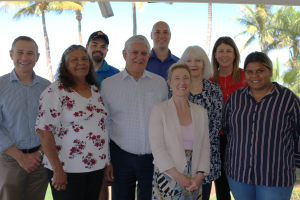This week, national, state and local representatives, came together to commit to action to reduce the unacceptably high rate of suicide, particularly youth suicide, in the Kimberley.
Community members and leaders, health and social services organisations, and Federal and State Government representatives reaffirmed their commitment to suicide prevention at two landmark meetings. These pulled together many distinct but overlapping themes, including youth social and emotional wellbeing.
A Youth Wellbeing Workshop, a joint initiative of the Western Australian Government and the Australian Government funded Kimberley Aboriginal Suicide Prevention Trial (the Trial), was the first of several opportunities for community input on the State Government’s Statement of Intent on Aboriginal Youth Suicide.
A subsequent meeting of the Trial’s Working Group, co-chaired by Minister for Indigenous Australians, Ken Wyatt and attended by Western Australian Deputy Premier, Roger Cook and recently appointed National Suicide Prevention Advisor, Christine Morgan, was an opportunity to further build on this momentum, receive feedback from the preceding day’s youth forum, and hear more about the Trial’s progress, as it enters its fourth and final year.

Kimberley Aboriginal Medical Services Deputy CEO and Trial Working Group Co-Chair, Rob McPhee, said it had been a unique opportunity to bring together community and government agencies with a common goal.
“The intention is to sustain this groundswell of support from the community and government, with everyone indicating their strong commitment to delivering sustainable change,” Mr McPhee said.
“It was recognised that reducing suicide is not just about health and mental health; it is about looking at broader community issues and addressing those that put Aboriginal people at a higher risk.
“It was heartening to see emerging young leaders, like Jacob Smith, Bianca Graham and Trent Ozies, speak confidently about the willingness of our young people to lead and action positive change to improve their future and that of future generations.”
Part of the solution, is the need for young people to be empowered, upskilled and employed, and to have a strong representational voice and structures to support their work.
The Trial has made significant progress in recent months, with work completed or well underway on:
- Eight community action plans in the East and West Kimberley
- Two Empowered Young Leaders’ forums, an impact statement and report with recommendations
- A regional “no wrong door’ approach for people seeking help from mental health and social and emotional wellbeing services
- A traditional healers’ model to work with mental health services
- Upskilling GP capacity and confidence in suicide prevention.
There are also plans to run a workshop to explore safe spaces for young people.
A strong cultural framework underpins all the Trial’s activities and all the projects identified by the communities must fit within the systems-based approach, guided by the Aboriginal and Torres Strait Islander Suicide Prevention Evaluation Project (ATSISPEP).
The outcomes will be evaluated by the Australian Government, as part of a national evaluation to find the most effective approaches to suicide prevention for at-risk populations and share this knowledge across Australia.
Helplines
If you find yourself in an emergency, or at immediate risk of harm to yourself or others, please contact emergency services on 000. Other 24-hour services include: Lifeline on 13 11 14 and Suicide Call Back Service on 1300 659 467.
Media Contact
Fiona Clark, Corporate Affairs Advisor, WA Primary Health Alliance
Tel: 0437 563 735 Email: fiona.clark @wapha.org.au
To access a pdf version of this media release, download here
About the Kimberley Aboriginal Suicide Prevention Trial
The Kimberley Aboriginal Suicide Prevention Trial Site is one of 12 sites nationally identified by the Australian Government as priority areas for suicide prevention due to their high-risk populations. The Trial aims to identify the best approaches to doing this, which will inform a wider national approach.
The Trial is guided by the recommendations of the Aboriginal and Torres Strait Islander Suicide Prevention Evaluation Project (ATSISPEP) and is focused on the following nine areas: Broome, Bidyadanga, Dampier Peninsula, Derby, Fitzroy Crossing, Halls Creek, Kununurra, Wyndham and Balgo.
The four-year Trial comprises a planning and implementation phase and its findings and outcomes will be evaluated by the Australian Government, as part of a national evaluation.
The Kimberley Trial is led by the WA Primary Health Alliance, Country WA PHN. It has partnered with the Kimberley Aboriginal Medical Services (KAMS) who is responsible for the Trial’s operationalisation. A Working Group, co-chaired by the Minister for Indigenous Australians, Ken Wyatt AM MP and the KAMS Deputy CEO, has strategic oversight of the Trial and a Steering Committee has operational oversight.
